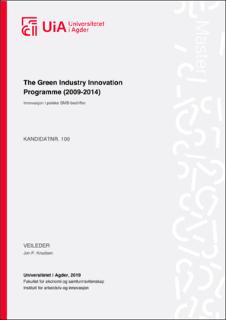| dc.description.abstract | The topic for this master’s thesis is innovation in polish Small and Medium-size Enterprises (SMEs) which took part in Innovation Norway’s “The Green Industry Innovation Poland Programme 2009-2014”. The last years have seen remarkable interest for innovation and green technology in many countries. Since innovation is a costly process, however, not all businesses can afford to be innovative, particularly SMEs. As per today, the Polish authorities do not supportprivately-owned innovative businesses with public funds. Such companies are dependent on applying for subsidies from foreign contributors such as grants from the EU or Norway. This thesis is based on the following research question: “How is innovationperceived in Polish SMEs which participated in The Green Industry InnovationProgramme (2009-2014), and can these businesses be described as innovative?”The theoretical framework is characterizedby different definitions and measurement indicators guiding how to perceive innovativeness, what it implies, what it means to be innovative, which factors which contribute to innovation, and what the benchmark is to describe a business as innovative, and how companies can reach that goal.To bring an answer to the topic raised, the starting point for the thesis is a case study of two select businesses anda programme operator, where empirical knowledge was obtained through interviews with employees, representatives of Innovation Norway and from documentation thattheauthor received from Innovation Norway itself. The intention when presenting the findingsand their subsequent analysis is to assess the empirical knowledge which was gathered in light of the theoretical considerations which underpin this topic.Before completing the qualitative study, the assumption was that the targeted businesses would havea certain knowledge about innovation, particularly given their participation in the “Green Industry Innovation Poland Programme”. The expectation was that Innovation Norway played a rather more important role in the project than turned out to be the case, and that guidelines regarding the innovation part of the programme would be on an academic level. Findings from this study have on the contrary shown that the level of knowledge regarding innovation is rather low, and that Innovation Norway set rather low innovation requirements in the programme, which therefore had alimited impact on participating businesses.The main results of this study indicate that innovation is perceived differently from business to business, something which can be a consequence of the lack of consistency from the Programme operator as regards the implementation of innovative projects under the “Green Industry Innovation Programme (2009-2014)”. This in its turn may explain that it has proven challenging to find a suitable method to measure whether businesses can be characterizedas innovative. | en_US |

